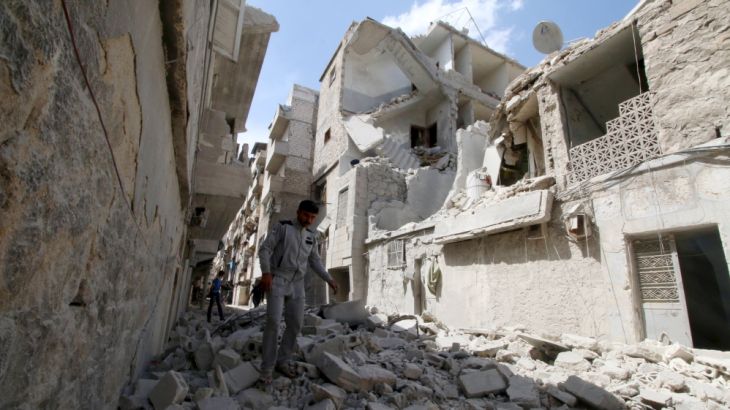Syria civil war: UN evacuates four besieged towns
Safe passage secured for sick and wounded in four towns as government pushes renewed offensive against rebels.

The United Nations has started evacuating hundreds of people from besieged Syrian towns in a rare sign of humanitarian progress that came as tens of thousands of civilians fled fresh fighting.
Safe passage was secured for those in need of medical attention from four towns on Wednesday – a complex mission as a strained ceasefire appeared to buckle further.
Keep reading
list of 4 itemsUN report charts lethal cost of migration over past decade
Conflict, climate, corruption drive Southeast Asia people trafficking: UN
Bodies of three Rohingya found as Indonesia ends rescue for capsized boat
|
|
Spokesman Stephane Dujarric said plans were afoot to evacuate about 500 people, including the sick and wounded along with their family members from the four towns.
People were evacuated from the rebel-held towns of Zabadani and Madaya near Damascus, and the government-held towns of Foua and Kefraya in northwest Idlib province.
On the outskirts of Madaya, where dozens of residents starved to death last year, seven large white buses were used to take the people out.
Dozens of men, women and children got out of the bus and were checked by security officials before boarding once more, the AFP news agency reported.
Al Jazeera’s Andrew Simmons, reporting from the Turkish city of Gaziantep close to the Syrian border, said a convoy came under fire while carrying out the operation.
“Whether the attacks were directly aimed at the convoy carrying people from Madaya is unclear,” he said.
“People from Zabadani and Madaya are mostly civilians, but there are also 25 soldiers being carried to safer areas in the country.”
In a separate statement on Wednesday, the UN said at least 40,000 Syrians had fled fighting near Aleppo, a northern city, in recent days as the government pressed an offensive against the opposition despite the truce.
Four million people besieged
The escalating violence has pushed people eastwards towards the strategically vital town of Azaz, which is on the border with Turkey, as well as the Bab al-Salameh and Sijjou refugee camps, the UN Office for Humanitarian Affairs said.
READ MORE: Here is what school is like in Syria’s Aleppo
“We are extremely concerned at the intensification of fighting in northern Syria and its impact on civilians, as well as humanitarian delivery to the area, and continue to monitor the situation closely,” Ariane Rummery of the UN refugee agency said.
The medical charity Doctors Without Borders said that there were now more than 100,000 people trapped on the Syrian side of the Turkish border.
It said that 35,000 of those had fled in the past week from camps that had been taken over by the Islamic State of Iraq and the Levant (ISIL, or ISIS) or had become too close to a creeping frontline.
Turkey has closed its frontier to all but the most seriously ill or wounded.
More than four million people in Syria live in besieged or hard-to-reach areas, with limited or no access to food or medical supplies.
Debate over Assad’s future
The UN has long pressed the Syrian government to grant unrestricted access to these areas, and has asked all sides to end sieges.

But, despite fierce criticism, the government frequently denies passage to aid convoys or limits what kind of assistance can enter cut-off areas.
READ MORE: Assad’s future not on the table
The opposition cited the dire humanitarian situation and the Syrian army offensive when it walked out of peace talks in Geneva this week, saying it needed a “pause”. The future of Assad also proved a major sticking point.
The already-shaky ceasefire between the government and some rebels was severely strained on Tuesday when at least 44 people were killed in air strikes on two markets in the northwest.
The Geneva talks are aimed at ending the five-year war by fashioning a political transition, writing a new constitution, and holding fresh elections by September 2017.
The war has killed at least 250,000 people and scattered millions of fleeing Syrians across the world.